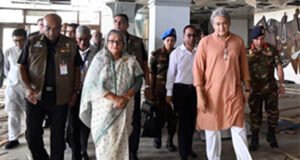
Prime Minister Sheikh Hasina on Friday called for strengthening mutual trust and respect and building partnership among the Indian Ocean region countries along with fostering maritime diplomacy for the region’s ‘resilient future’.
Inaugurating the two-day Indian Ocean Conference (IOC) here this evening, she also sought active global support to repatriate the Rohingyas to their homeland in a sustainable manner.
“The Indian Ocean holds significant importance for not only Bangladesh, but for all the countries in the region due to its geographical position. I would like to underscore six priority areas at this 6th Indian Ocean Conference. We have recently formulated its Indo-Pacific Outlook,” Sheikh Hasina said.
The sixth edition of the conference is being organised by India Foundation in association with the Ministry of Foreign Affairs, Government of Bangladesh.
Mauritius president, minister and state minister-level delegations from 25 countries, including Indian external affairs minister, are attending the conference.
Besides, around 150 foreign guests, including representatives from D8, SAARC and BIMSTEC are taking part in the event. Myanmar was not invited to the conference.
In the inaugural session, Mauritius president Prithvirajsing Roopun, Vice-President of Maldives Faisal Nassem, External Affairs Minister of India Dr S Jaishankar, Minister in the Prime Minister’s Office and Second Minister of Foreign Affairs of Singapore and Dr Maliki Osman, also spoke.
Bangladesh Foreign Minister Dr AK Abdul Momen spoke virtually while State Minister for Foreign Affairs M Shahriar Alam was present on the dias.
Placing the proposals, the Prime Minister put emphasis on strengthening mutual trust and respect among the member countries for building strong partnerships to ensure stability for a resilient future in the Indian Ocean.
She said the countries in the Indian Ocean region should foster “Maritime Diplomacy” for their development, thereby ensuring a prosperous future while climate vulnerability of many countries in the region calls for enhancing cooperation to reduce the impact of natural disasters.
The premier also stressed the need for strengthening the existing mechanisms on maritime safety and security in the Indian Ocean, including response to emergencies at sea, conducting search and rescue, and upholding the exercise of freedom of navigation and overflight, in accordance with international law.
She called for promoting ‘culture of peace’ and people centric development in the region while women, half of the global population, should get due attention, for building peaceful, just and inclusive societies in the region.
She said it is required to promote open, transparent, rules-based multilateral systems that facilitate equitable and sustainable development in the region and beyond through inclusive economic growth.
The Prime Minister said despite many challenges, Bangladesh provided temporary shelter to more than 1.1 million forcibly displaced Myanmar nationals.
“This gesture avoided a major humanitarian catastrophe in the region. Now, we seek active support of the global community to repatriate the Rohingya people to their homeland in a safe and sustainable manner,” she added.
Bangladesh, as a littoral state, has been a hub of maritime activities for centuries and it is active in many regional platforms, she said, adding that Bangladesh is the current Chair of the Indian Ocean Rim Association and it is also the current President of the Council of the International Seabed Authority.
Sheikh Hasina said Bangladesh believes in the challenges, traditional and non-traditional, that the Indian Ocean region is facing.
“We remain committed to playing our role for peace in the region, and expect all other countries to do the same to ensure a resilient future,” she said.
She said the region’s oceans and seas account for 90% of world trade and 60% of oil transportation and the real value of global maritime trade has remarkably tripled in the past 15 years.
“Oceans offer excellent opportunities in supporting sustainable development in countries the world over. Yet much of the potential still remains untapped,” she added.
The Prime Minister said the Indian Ocean region has significant economic, political, and strategic implications in the Asia-Pacific and African regions. It shares 64 percent of global population and 60 percent of global GDP, she said.
Despite its potential, she said this region faces many challenges. The countries in the Indian Ocean region, therefore, need to foster partnerships and cooperation for ensuring peace, and prosperity for all, she added.
The Bangladesh premier said Father of the Nation Bangabandhu Sheikh Mujibur Rahman underscored optimum utilization of the nation’s maritime resources for its development, growth and stability.
As a visionary leader, Bangabandhu enacted the “Territorial Waters and Maritime Zones Act, 1974”, to set the limit of Bangladesh’s ‘Maritime Zones’; to enable conduct of different activities within the limit, and also, to facilitate exploration of sea resources, she said.
Notably, she said, this Act came into force eight years prior to the “United Nations Convention on the Law of the Sea, 1982”, at a time when the global community had limited understanding of the matter.
Sheikh Hasina said the theme of the Conference – “Peace, Partnership and Prosperity: Towards a resilient future” – is very appropriate and timely.
The theme becomes all the more relevant in light of the recent Covid-19 pandemic, and the ongoing Russia-Ukraine conflict, and consequent sanctions and counter-sanctions, she observed.
“These have posed unprecedented challenges for all nations world over. Global recession, food, energy, and fertilizer crises have resulted in unbearable living conditions for all people of the world. The Indian Ocean region has also been facing challenges such as climate change, maritime security, terrorism, and natural disasters,” she said.
To overcome them, she said the countries in the region must come together to build partnership, and put collective efforts to promote peace and prosperity, for a brighter region.
In the context of the post-Covid world and the Russia-Ukraine war, she said a resolution titled “International Year of Dialogue as a Guarantee of Peace, 2023” was adopted unanimously at the UNGA in December 2022.
In that resolution, the historic quote of the Father of the Nation from his 1974 UN speech, which is also the foreign policy dictum of Bangladesh, was inserted in the 14th paragraph, she added.
It reads: “Recognizing the importance of combating poverty, hunger, disease, illiteracy, and unemployment, and emphasizing that friendship to all and malice towards none, in the spirit of constructive cooperation, dialogue, and mutual understanding, will help to achieve these objectives.”
She said it is so relevant for Bangladesh in the Indian Ocean region as the country endeavors to formulate actions for a resilient future.
In line with the quote of Bangabandhu Sheikh Mujib, she said, Bangladesh needs effective ‘partnership’ in the form of meaningful cooperation, dialogue and mutual understanding to achieve its shared objectives of ensuring peace and prosperity in the region.
Quoting Father of the Nation Bangabandhu Sheikh Mujibur Rahman, she said, “Peace is an imperative for the survival of mankind; it represents the deepest aspirations of men and women throughout the world.” In that speech, he particularly emphasized on keeping the Indian Ocean as a peaceful area.”
In his pursuit of world peace and human rights, Bangabandhu Sheikh Mujib was awarded the Joliot-Curie Medal of Peace on 23 May, 1973, she said.
Following Bangabandhu’s philosophy, Sheikh Hasina said Bangladesh became an ardent advocate for world peace. “In 1997 at the United Nations General Assembly, we tabled a resolution on “Culture of Peace” which was unanimously adopted,” she added.
Subsequently, she said the United Nations declared the year 2000 as the “International Year of Culture of Peace,” and designated the years 2001-2010 as the “Culture of Peace and the Decade of Non-violence.”
“Bangladesh views the “Culture of Peace” as an essential element that will reinforce all aspects of peace. It is why Bangladesh is committed to UN’s global peacekeeping and peace-building endeavors. Currently our troop contribution to United Nations Peacekeeping is among the highest in the world,” she said.
The Prime Minister said over the last decade, Bangladesh made significant strides in socio-economic growth and social justice.
“Bangladesh is now the 35th largest economy in the world. Extreme poverty rate has gone down to 5.6 percent in recent years, and our per capita income has tripled to 2824 USD within a decade. Bangladesh has met all of the necessary criteria for graduating from the Least Developed Country (LDC) category to a developing country in 2026,” she said.
Sheikh Hasina said they aspire to build “Smart Bangladesh” with robust physical infrastructure to support a thriving economy. “Last year, we inaugurated the self-funded ‘Padma Multi-purpose Bridge”.
The Prime Minister said recently they inaugurated the first-ever Metro Rail service in their capital. “We shall soon complete the Bangabandhu Sheikh Mujibur Rahman Tunnel, a 3.2-kilometer under-river tunnel in Chattogram, the first of its kind in South Asia,” she added.
“Our aspiration is to transform Bangladesh into a knowledge-based, modern, developed country, the ‘Sonar Bangla’ by 2041, and to build a prosperous and climate-resilient delta by 2100. Our strategy for achieving these goals involves promoting sustainable economic growth and generating opportunities for all,” she said.
 Weekly Bangla Mirror | Bangla Mirror, Bangladeshi news in UK, bangla mirror news
Weekly Bangla Mirror | Bangla Mirror, Bangladeshi news in UK, bangla mirror news







